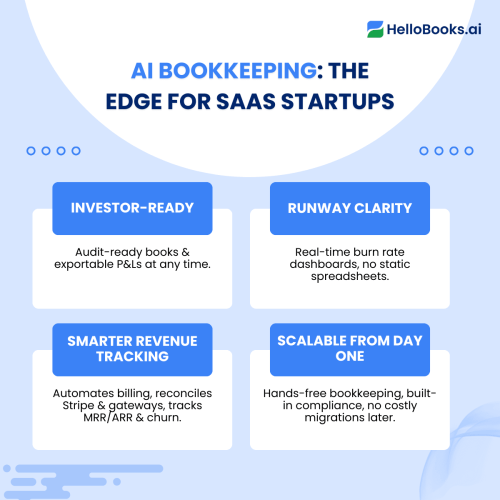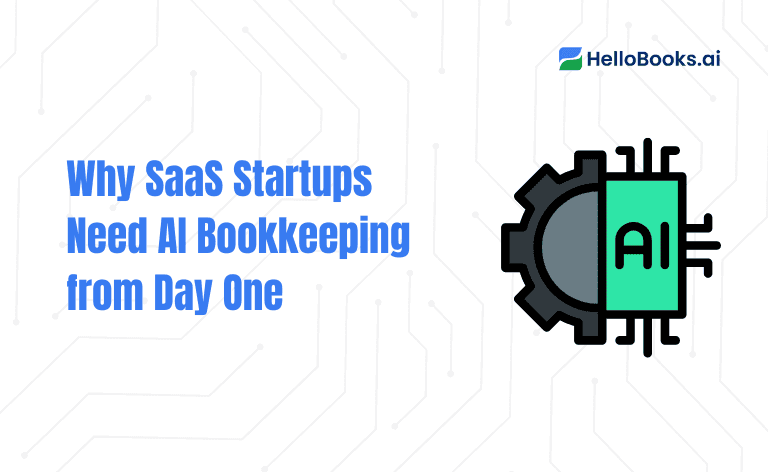The merits of AI Bookkeeping to SaaS Startups
SaaS startups are fond of making fantastic products and expanding rapidly, but fiscal madness moves at a pace that is more rapid than anticipated. Without a strong startup accounting foundation, founders struggle with late reports, missing expenses, and unorganized books just when investors start asking questions. This is the reason why it is no longer up to choice to embrace AI bookkeeping as early as possible.
With AI tools for financial reporting, SaaS founders can automate smart categorization, maintain audit-ready books, and get a clear picture of SaaS finance in real time. From tracking subscriptions and managing cash flow to building hands-free bookkeeping systems, AI removes the guesswork from early-stage financial operations. In addition, when fundraising time comes, your books are clean, up-to-date, and credible.
Your finances can never wait until you grow; make sure that you have a back office that can scale and be attractive to investors even on day one.
The Reason Why Bookkeeping in Startups (SaaS) Is More Complicated
SaaS startups have special financial issues that cannot be processed through conventional bookkeeping systems. Unlike standard businesses with straightforward transactions, SaaS companies deal with recurring revenue streams like MRR and ARR, which complicate SaaS finance tracking. Prepayments and deferred revenue should be reported properly so as not to confuse the income statements’ accounting of subscriptions that span billing periods.
To add to that, revenue recognition is actively delayed through multi-tier pricing, upgrades, downgrades, and churn. Most of the early-stage founders attempt to control it with spreadsheets or manually, which brings delays and inaccuracy to the process at a moment when accuracy is critical.
Accurate startup accounting isn’t just about staying organized; it’s about being investor-ready. Stakeholders expect clean, audit-ready books and a real-time understanding of burn rate, runway, and growth metrics. In the absence of automation, reporting turns out to be a bottleneck.
That’s where platforms like HelloBooks.ai come in, leveraging AI tools for financial reporting to deliver smart categorization, subscription insights, and hands-free bookkeeping tailored to the SaaS model from day one.
What is AI bookkeeping?
AI bookkeeping can be described as the use of intelligent, automated programs that can handle monetary data based on machine learning, pre-set rules, and software connectivity. For SaaS finance, this means automating core tasks like transaction matching, smart categorization, and real-time reporting without manual effort.
Instead of relying on spreadsheets and delayed reconciliations, AI tools like those offered by HelloBooks.ai act as a virtual finance assistant, delivering hands-free bookkeeping and instant insights. The founders, along with finance teams, can have access to real-time dashboards where important SaaS metrics such as MRR, burn rate, and cash flow can be observed on a single screen.
In contrast to conventional startup accounting, AI bookkeeping is less error-prone, time-saving, and has your books ready to be audited in the first place. These systems scale with you as your SaaS business grows–and they increase without generating overhead costs as transaction volumes grow.
The Main Triumphs of AI Bookkeeping Issued to SaaS Startups
In the SaaS startup, financial visibility is not a luxury; it is a differentiator to future growth, to the attraction of investment, and to the formulation of strategic direction. What AI financial reporting tools, such as the ones provided by HelloBooks.ai, can do to make startups successful is the following:
a) Subscription Revenue vs. Accounting system
SaaS businesses work with complicated billing models- monthly, annual payment, trial-based, and usage-based billing. On automated tracking of subscription revenue, AI bookkeeping systems manage the automated billing intervals, recognize up/downgrades, and compute churn without user intervention. CRMs, such as HelloBooks.ai, automate reconciliation of Stripe and other gateway data, keeping you always on top of MRR, ARR, deferred revenue, and never having to open a spreadsheet.
b) Improved runway visibility and Burn rate
Startups can either kill or die through their burn rate. Real-time dashboards powered by AI allow an accurate monitoring of the expenses, net burn, and remaining runway. These systems work differently from the static spreadsheets as new transactions run them automatically, so founders have a live picture of how their SaaS finance is doing, and allow proper predictability.
c) Investor/Stakeholder readiness
Messy books may cause funding delays or the loss of opportunities during the funding rounds. AI tools for financial reporting generate audit-ready books, exportable reports, and always-updated P&Ls, balance sheets, and cash flow statements. No matter what the situation is, be it prepping a pitch, and/or meeting investor due diligence, HelloBooks.ai keeps your finances in order and presentation-capable.
d) DayOne scalability
After much growth, many founders find it necessary to install correct systems, but by that time, it is too late because startup accounting corrections are expensive. The AI bookkeeping platforms can be resizable. With hands-free bookkeeping, built-in compliance, and smart infrastructure from the start, you avoid future migrations and reduce your finance team’s manual load as you grow.
To be brief, AI bookkeeping is not merely automation but an intelligent infrastructure that will be fast and involved, and as swift as SaaS.

Why Day One Matters: The Cost of Waiting
- It is seen that most SaaS start-ups postpone the application of startup accounting systems by thinking that they can clean it up later, but it is only a very time-consuming and costly process.
- In the absence of AI-powered financial reporting, early books are not accurate, and that complicates forecasting, pricing, and recruiting in an optimistic manner.
- The founders who spend hours balancing the spreadsheets or maintaining the manual expense tracking lose their precious time, which should be devoted to creating the product or getting users on board.
- Poor financial setup delays access to audit-ready books, which becomes a roadblock during funding, due diligence, or investor reviews.
- Late adoption adds jurisdictional gaps and blind spots on economics that slow down an organization and add risk exposure.
- By using hands-free bookkeeping with tools like HelloBooks.ai, SaaS startups gain real-time visibility, smart categorization, and scalability from day one.
- Being right out of the gate gives a good starting point of SaaS finance clarity, and all subsequent decisions are clearer, quicker, and investor-ready.
What to Do to Start Gaining Energy?
SaaS startups have it easier than ever to get started with AI bookkeeping–more easily, that is, than with ordinary bookkeeping. The first step is to select an appropriate platform, such as HelloBooks.ai, which fits your currently used stack: Stripe to be able to receive recurring revenue, CRMs to manage data about your customers, and connected bank accounts to keep those in sync in real-time.
Next, define smart categorization rules for expenses and set up logic to track subscription revenue and recognize deferred income accurately. With hands-free bookkeeping, recurring reports like burn rate summaries or profit and loss statements can be scheduled and delivered automatically.
They should be assigned simple tasks within your system, leave such mundane tasks as data entry and reconciliation to the AI, and have a founder or CFO review it. This sandwich will guarantee your startup accounting is lean and audit-ready on day One. Financial visibility in real time is not only a possibility, but with platforms such as HelloBooks.ai, it is scaled by design.
In conclusion
SaaS finance does not really need to be figured out at a later stage because it needs to be made simple on the first day. All the management of deferred revenue, multi-tier subscriptions, and burn rates is just too much to manage with legacy accounting practices used by start-up companies. This is the reason why AI tools, such as HelloBooks.ai, are needed for financial reporting.
With features like hands-free bookkeeping, smart categorization, and audit-ready books, founders gain financial control without the manual grind. Early implementation guarantees real-time transparency, a scalable framework, and investor-ready reports at the correct time.
And when you are building SaaS, do not only sell more of your product, but also more of your books. Get finance back office done by AI bookkeeping so that you can pursue product, users, and expansion. Solutions, such as HelloBooks.ai, provide you with the financial base and confidence you want to raise, predict, and expand.
